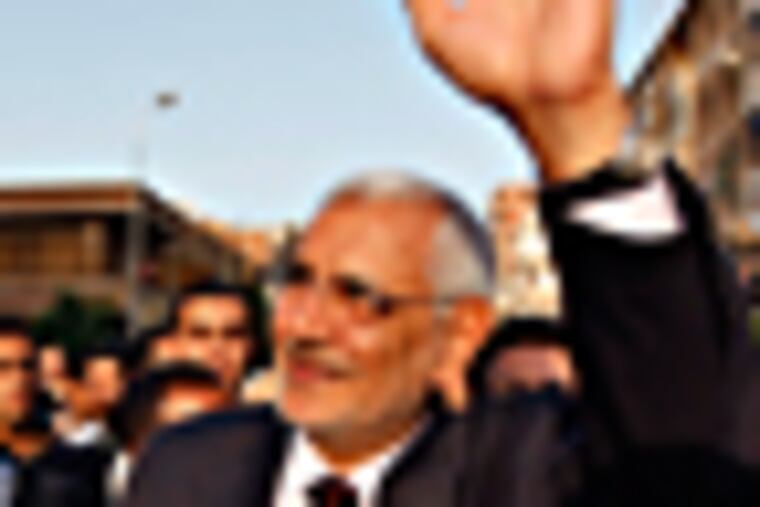Egypt narrows election field
A Mubarak regime official and two Islamists are the leaders among 13 candidates for president.

CAIRO - Egypt's presidential race is boiling down to a contest between Hosni Mubarak's former foreign minister and two Islamists with strong bases of support after the election commission on Thursday released the final list of 13 candidates.
None of the front-runners represents the largely liberal and secular youth who drove the uprising that toppled Mubarak's autocratic regime 14 months ago, dimming their hopes that the winner will bring dramatic democratic change in the country.
Instead, what has emerged as the key question in next month's vote to choose the first president after nearly 30 years of rule by Mubarak is whether the country of 85 million takes a turn toward religious rule or remains a mainly secular state.
Divisions among supporters of each camp have left the race highly unpredictable. Islamists showed their electoral power in parliamentary elections late last year in which the Muslim Brotherhood and members of the ultraconservative Salafi movement won around 70 percent of the legislature's seats. But in the presidential race, their backers are split between the Brotherhood's candidate, Mohammed Morsi, and a more moderate Islamist, Abdel-Moneim Abolfotoh.
Former Foreign Minister Amr Moussa has emerged as the strongest secular alternative. Moussa has distanced himself from the old regime and gained acceptance from some liberal and secular factions, but he remains mistrusted by some who see him as too close to his former boss, Mubarak. Abolfotoh, who broke from the Muslim Brotherhood last year, appeals not only to Islamists but also some liberals who find Moussa unpalatable.
Also hanging over the race is the military, which has ruled since Mubarak's fall on Feb. 11, 2011. It has promised to hand over power to the election's winner but many believe it is trying to carve out a permanent role for itself in politics.
The liberal youth groups credited with Mubarak's stunning ouster are divided and weakened, victimized by a systematic campaign to discredit them by the generals, the Islamists and a powerful state and private propaganda machine that has sided with the military against everyone else. The closest thing to their own candidate is Khaled Ali, a rights lawyer who is little known to the public and likely to end up among the ranks of the also-rans.
A potentially stormy campaign for the vote, scheduled for May 23-24, now officially begins after weeks of confusion and dramatic lurches in Egypt's politics.
The Brotherhood, which already holds nearly half the seats in parliament, reversed an earlier promise not to enter the race and fielded a candidate. Mubarak's former spy chief Omar Suleiman - seen by many as too tainted to even consider running - also threw his hat in the ring at the last minute.
Then the military-appointed election commission dropped a bombshell earlier this month by disqualifying 10 would-be candidates, including three who were seen as the most powerful: the Brotherhood's deputy leader Khairat el-Shater, Suleiman, and a lawyer-turned-Islamic preacher, Hazem Abu Ismail, who was popular among Salafis.
The disqualifications raised court cases and led to street protests.